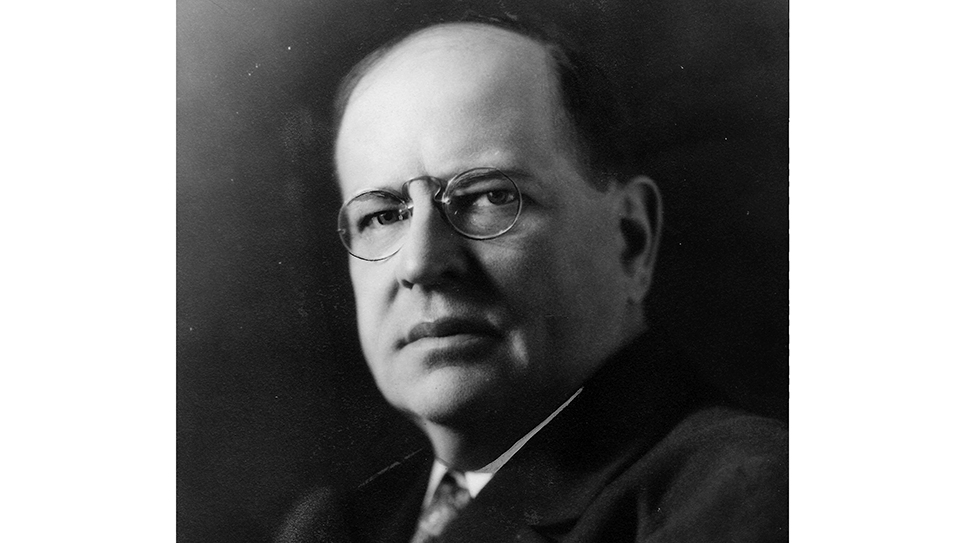By Ray Hill
Carroll Reece, congressman from Tennessee’s First District for a decade, had been upset in the 1930 election by Oscar Byrd Lovette, the former district attorney for a few counties surrounding Greene County. Lovette’s victory had been highly improbable; Lovette had only announced and run a campaign during the last ten days before the general election. Lovette, who had been a Republican all his life, ran as an Independent and drew the support of disgruntled Republicans and Democrats. Reece had been challenged inside the Republican primary that year by attorney Sam W. Price, who ran a strong race. Much of the criticism surrounding Congressman Reece had to do with his failure to support the governmental operation of Muscle Shoals, the forerunner of the Tennessee Valley Authority, as well as the construction of the Cove Creek Dam. Reece had taken the side preferred by President Herbert Hoover, which favored private operation of power generated by water for consumers.
Reece’s defeat marked the first time in fifty-two years someone other than a Republican had represented the First Congressional District in the U. S. House of Representatives. Carroll Reece, stunned by his defeat, had built an effective organization throughout his upper East Tennessee district and set out to reclaim his seat in Congress. Congressman O. B. Lovette, realizing his district was thoroughly Republican, supported the GOP candidate for Speaker. Lovette also was running for reelection in 1932 inside the Republican primary where he faced his predecessor.
Carroll Reece was hardly the only person who had held elective office in Tennessee who supported the concept of private concerns harnessing the power produced by water and selling it to consumers. William E. Brock, a wealthy candy manufacturer from Chattanooga, had been appointed to the United States Senate when Lawrence D. Tyson had died suddenly in 1929. Brock had been elected to serve out the remainder of Senator Tyson’s term, which ended March 3, 1931. Brock ran afoul of his former colleague, Tennessee’s senior United States Senator, Kenneth D. McKellar, who was a fierce advocate of governmental operation of Muscle Shoals, as well as an implacable foe of private power interests. When a delegation from Chattanooga’s Chamber of Commerce descended upon Washington, D. C. to lobby for private power, Senator McKellar’s legendary fiery temper heated up. The specific target of McKellar’s ire was one Mercer Reynolds, whom the senator described as a manufacturer and former president of the Chattanooga Chamber of Commerce. Yet the way McKellar enunciated it, the description seemed more tinged with infamy than it was wholesome. The delegation from in and around Chattanooga included Ed Bass, the mayor of Chattanooga, as well as Adolph Ochs, Jr., the publisher of the Chattanooga Times and Frank H. Dodson, the mayor of Athens, Tennessee. Unfortunately, Mercer Reynolds and Senator Brock gave interviews to members of the news media, which McKellar felt were attacks upon his record. The peppery McKellar promptly fired back. Senator McKellar charged his former colleague with dealing in bad faith and being on both sides of the issue, saying Brock had been for governmental ownership and private leasing. McKellar charged Brock with “consorting and advising with former Congressman Carroll Reece and President Hoover” McKellar pointed out both Reece and Hoover were “private leasing advocates at a time ‘while you voted or paired every time for the Norris bill.’” McKellar made short work of Mercer Reynolds in a brief letter, referring to Reynolds as a “wicked falsifier” and “a perennial and offensive lobbyist for the favor-seeking interests.” McKellar added Reynolds was “an ignorant and kept tool of the interests and a boasting braggart.” The public letter to Mercer Reynolds, according to the Knoxville Journal omitted “the customary designation of “mister” and the usual salutation of “dear sir” and merely contains Reynolds’ name at the top.”
Carroll Reece had apparently learned a valuable political lesson and it is hardly surprising the former congressman’s views on public versus private power were undergoing a change. The fight between Reece and O. B. Lovette continued during the Republican National Convention in 1932. Both factions jostled for recognition from national Republicans. Of more importance to the people of the First District was the late June announcement Carroll Reece had been named to serve on the Board of Directors for Lincoln Memorial University.
Following his official announcement he would be a candidate for Congress inside the Republican primary, Carroll Reece traveled to Carter County where he charged O. B. Lovette had been aided politically by Governor Henry Horton in 1930. It is likely impossible for readers to imagine just how unpopular Henry Horton was with Tennesseans in 1932. The governor had presided over the loss of most of the state’s finances with the collapse of the House of Caldwell and other banking interests during the Great Depression. Horton had used every means at his disposal to avoid impeachment and only squeaked by through the narrowest of margins. In Elizabethton, the wealthy Reece made the charge O. B. Lovette had spent more money in the 1930 campaign than had ever been spent during a congressional race inside the First District. While campaigning in Johnson City, Reece said, “The genial General was so shocked by the ‘sorry plight’ in which he found the Republican party, that he pooled large sums of money for the benefit of himself and Horton against Arthur Bruce, the Republican nominee.” It was an interesting charge for Reece to level against O. B. Lovette and bold as well, especially considering Governor Horton had appointed the former congressman’s brother Joe Tennessee’s Commissioner of Insurance.
Congressman O. B. Lovette opened his drive for the GOP nomination for Congress from Tennessee’s First District in Dandridge. According to the Knoxville News-Sentinel, some 1200 people packed the high school auditorium to hear the congressman speak. Amplifiers allowed some 400 people gathered outside of the full auditorium to hear Congressman Lovette’s speech.
Lovette defended his stand for having voted in favor of the cash payment of the soldier’s bonus bill, as well as his vote against Speaker John Nance Garner’s proposed “relief” legislation. Lovette’s wife and two sons and his daughter sat in the audience as the congressman spoke. O. B. Lovette dismissed Carroll Reece’s charge he had refused to run in the 1930 GOP primary. “It wasn’t a primary,” Oscar Byrd Lovette barked. “It was an auction sale in some counties, grand larceny in others, and both in some. Why, 12,000 more votes were counted in that primary for Reece and Price than Hoover got in the November election and 3000 more than Hoover and Smith both got.” Lovette chortled at the notion he had received any political help from Governor Henry Horton. “They take Granny Horton and use him for the goat of everything,” Lovette said. “Reece carried Johnson County over me by a majority of between 900 and 1000; Hull, the Democratic nominee for Senator, received 310 votes; Horton, the Democratic nominee for Governor, got 1087 votes – – – 700 more than Hull in this rock-ribbed Reece county.”
“And if any more proof is needed as to any Horton deal, it is passing strange that the day after the election, Horton bestowed the best office in the state on Reece’s brother. Why didn’t he give the job to my brother?” Lovette wondered.
Lovette told his listeners he had voted against the Garner relief legislation because it was merely a “pork barrel” bill. Congressman Lovette charged the Garner bill had been ladled down with “gravy and all the trimmings.”
Lovette spoke for an hour and fifteen minutes and apparently his audience thoroughly enjoyed it because a gentleman in the audience yelled “Talk some more!” as the congressman brought his remarks to a close. O. B. Lovette spoke for yet another fifteen minutes.
As O. B. Lovette was opening his reelection campaign in Dandridge, former congressman Carroll Reece was speaking to his own capacity crowd in Rutledge. Reece was met at Bean Station by the Morristown High School Band and a caravan of automobiles which followed him into Rutledge.
Reece made his usual stump speech, reminding his audience of the pork barrel projects he had brought to the First District which numbered at least six federal buildings. The former congressman noted his successor had voted against a bill which would have built three more federal buildings in the First District as well as an appropriation for the Smoky Mountains National Park. Reece told his listeners his record of acquiring federal buildings – – – and the jobs and services that came with them – – – was “a larger number than had been obtained for any other congressional district in the South.” Carroll Reece also said, “I am also proud of the part which I played in the establishment of the Smoky Mountains National Park.” Reece once again chastised Lovette for not doing more for his district. “While he was voting against these much needed improvements for his own district,” Reece said, “he voted for a hundred million dollar appropriation for the benefit of the financial houses which hold drainage bonds issued on various districts in the west.” Reece also pointed out Lovette had voted for “a three hundred million dollar relief bill, under the provisions of which no relief in any form would have come to this district.”
When Reece complained Lovette was misrepresenting his past record in Congress, Lovette, speaking in Erwin, Tennessee, snapped, “The only one I know that is carrying on a campaign of calumny and misrepresentation is the ex-Congressman himself.” While Lovette acknowledged Carroll Reece “had a splendid war record” the Congressman charged his predecessor’s “legislative record is the worst in history.” Lovette said Reece’s last official vote before leaving the House of Representatives was against his fellow ex-servicemen. Lovette cited the page number of the Congressional Record as proof of his accusation.
In spite of the open hostility of many voters toward President Herbert Hoover and many GOP candidates across the country, former congressman Carroll Reece was drawing good-sized crowds to his events inside Tennessee’s First Congressional District. Speaking at Cloudland High School at Roan Mountain, Tennessee, Reece claimed he had aided numerous veterans with their pension claims while in Congress. Reece had been introduced to the audience by Captain W. L. Nelson, a ninety-eight year-old veteran of the Civil War.
Reece invaded Greeneville, the home city of Congressman O. B. Lovette and spoke to a crowd estimated by his supporters of being 2500 – 3500 strong. Reece flatly charged Lovette with having “traded with Democrats to get a place in Congress” and trying to beef up his Republican bona fides ever since winning his seat in the House of Representatives. “I had more than 100 special acts passed, and Lovette has been in two years, but has none,” Reece crowed. Readers must recall at the time there was no Social Security and congressmen and senators frequently passed special acts to provide pensions for disabled citizens or veterans.
Congressman O. B. Lovette, a veteran of politics, proved well able to hold his own in the rough and tumble of a congressional race. Refuting Carroll Reece’s charge he had spent $33,000 in an alliance with Democrats in 1930, Lovette retorted, “That is a falsehood. If I had $33,000 I would never have run for Congress or any other public office, but rest.” Lovette hurled back Reece’s accusation the congressman had been the beneficiary of a political deal with disgraced governor Henry Horton. “Carroll Reece and Henry Horton were allied in the 1930 election,” Lovette cried, “and the appointment of Joe L. Reece was the culmination of this political alliance.” Lovette said he had voted against a new post office for Newport, Tennessee because it was in the Garner bill, “which, if passed would have bankrupted the country.” “I wouldn’t sell the credit of my country for a dozen post offices,” O. B. Lovette said.
There were two weeks remaining before Republicans went to the polls in Tennessee’s First Congressional District to choose a nominee for Congress.






